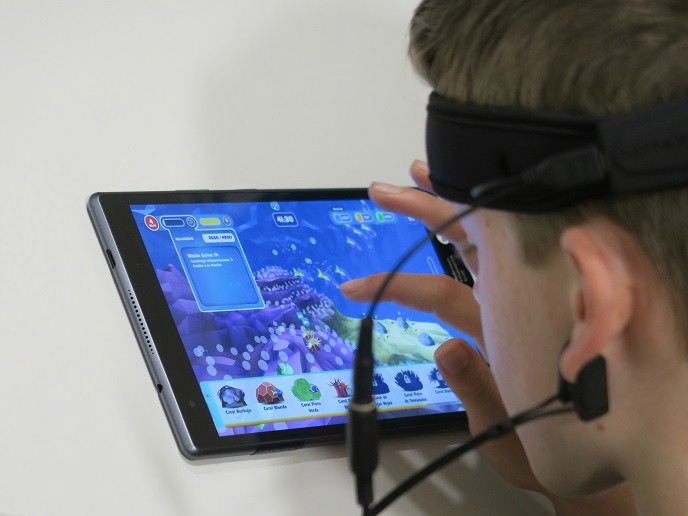Game-based intervention programme key to helping children with ADHD
“The FocusLocus(opens in new window) project aimed to provide an innovative and disruptive game-based intervention programme for assisting children to manage and overcome ADHD symptoms,” explains Stelios C. A. Thomopoulos, project coordinator. Backed up by solid cognitive science research, FocusLocus has resulted in the REEFOCUS gaming system that incorporates multisensory training methods for behavioural change as well as mental and motor skill acquisition. “The REEFOCUS solution aspires to be an efficient and cost-effective alternative in ADHD treatment without the undesirable side effects of currently established approaches (e.g. medication),” adds Thomopoulos.
A spotlight on REEFOCUS
The REEFOCUS game is set in a marine underwater environment and revolves around life preservation and expansion in the context of a coral reef ecosystem. “REEFOCUS is a non-violent, gender and cultural background neutral game with an educational character that promotes environmental awareness,” reports Thomopoulos. To improve ADHD symptoms, REEFOCUS was created to train certain targeted cognitive skills that are known to be associated with ADHD through a series of exercises in the form of mini-games. “The mini-games succeed in maintaining the player’s interest and engagement in contrast to conventional training exercises administered in clinical settings,” emphasises Thomopoulos. Furthermore, the mini-game format allows for a reliable performance evaluation and an adjustment in the level of difficulty of the cognitive skill training exercises. “The mini-games currently implemented in REEFOCUS aim at training delay aversion, inhibitory control, sustained attention, motor coordination, working memory and selective attention.” The game offers personalised treatment by targeting the diagnosed deficits and individual condition of each child and by adapting the training methods to match the child’s progress in the game. The game is complemented by the REEFOCUS web application that implements privacy-by-design principles and can be accessed through any web browser. Parents, clinicians and special needs educators can manage patient profiles, monitor their child’s progress, review performance-related statistical information, and customise game settings and intervention schedule. REEFOCUS was put to the test at a clinical pilot study in 2018 at Hospital San Joan de Déu, Barcelona, Spain. This involved 75 children diagnosed with ADHD. “All sessions were monitored through the REEFOCUS GDPR-compliant telemetry over a secure VPN,” explain Adam Doulgerakis, technical manager, and Maria Bessa, head of pilot implementation and ethics. “Initial telemetry data analysis suggests a definite improvement of the children’s performance in all areas of cognitive training used in the mini-games,” add project manager Tassos Kanellos and Eftichia Georgiou, in charge of data analytics.
Into the future
“REEFOCUS has been tested successfully in a clinical pilot. The wealth of data collected through the FocusLocus telemetry indicated the positive prospect of the game as a non-medication tool in treating ADHD,” says Thomopoulos. The project, among its next steps, is pursuing a large-scale clinical pilot to validate the proposed approach and to move towards the commercialisation of REEFOCUS. “We are moving in different directions. We are looking into different funding opportunities and instruments to raise capital to commercialise REEFOCUS,” highlights Thomopoulos. In parallel, the project is negotiating additional pilot studies with a larger number of participants and working on the benchmarking of the game in healthy populations as well as its extension to other cognitive disorders.







